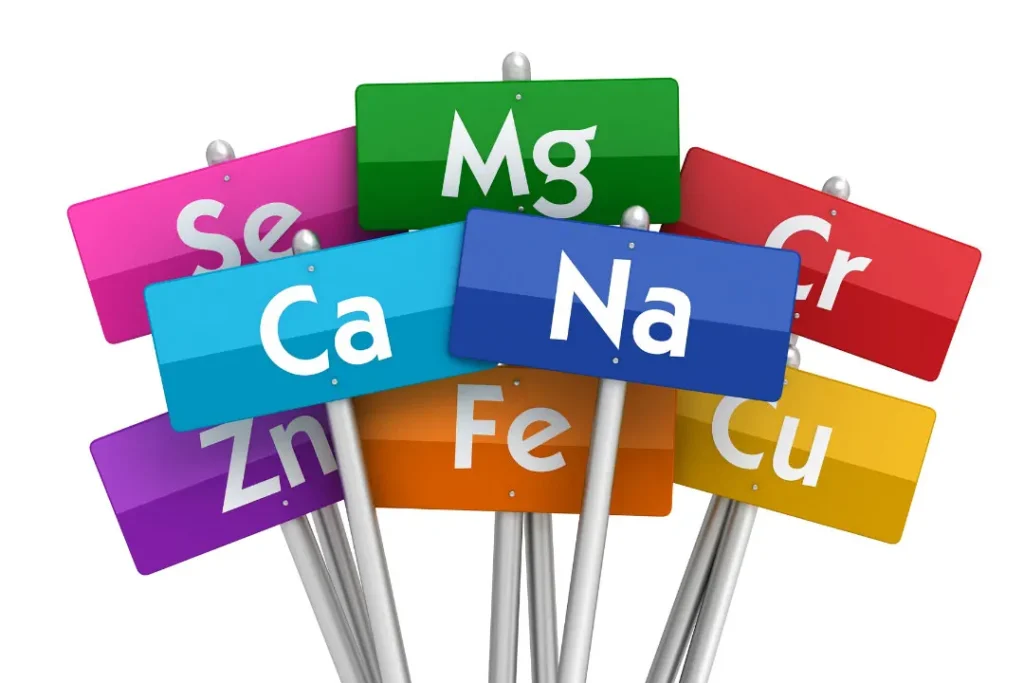Chelated minerals have gained prominence in the world of nutritional supplements as a result of their improved bioavailability and absorption qualities. They are crucial supplements to take into account as part of a healthy diet due to their particular chemistry and the vital roles that minerals play in many physiological processes.
You May Also Like:
Sunmed CBD vs. Partnered Process CBD: Finding the Best CBD for Sleep
What is Non Restorative Sleep? Here are 5 Great Ways to Get Quality Rest Every Night
Chelated Minerals: Benefits, Dosage, Side Effects, Drug Interactions, and Other Important Information is an original (NootropicsPlanet) article.
The Nature of Chelated Minerals
The word “chelated” is a translation of the Greek word “chele,” which means claw. It describes how a bigger molecule, usually an amino acid or protein, holds a mineral ion. A mineral forms a ring-like shape when it is chelated, or bonded to an organic substance. This method improves the mineral’s absorption and bioavailability in the body by making it easier for it to move through the intestinal wall during digestion. Iron, zinc, magnesium, calcium, and chromium are a few examples of chelated minerals.
A chelated mineral is essentially a coordination complex with the mineral ion at its core and a chelating agent attached. Around the mineral ion, the chelating agent, which is often an organic molecule like an amino acid, creates a stable ring structure. The chelated mineral may now more easily pass through the intestinal wall during digestion because to this configuration.
Health Benefits of Chelated Minerals
Chelated minerals provide a wide range of health advantages, mostly because of the improved bioavailability and absorption made possible by chelation. Chelated iron, for instance, is used to treat anemia, iron deficiency, and to enhance sports performance. Chelated zinc helps improve immune function and speed up wound healing, while chelated magnesium can help with the symptoms of anxiety, sleeplessness, and muscular cramps.
The health advantages of chelated minerals are similar to those of basic minerals, although they are often seen more quickly owing to the chelated forms’ improved bioavailability. But it’s important to realize that although chelated minerals might increase dietary mineral intake, they cannot take the place of a well-balanced, nutrient-rich diet.

Chemistry of Chelated Minerals
Chelation is the process of attaching a smaller chemical molecule, often an amino acid or a protein, to a mineral ion, such as iron (Fe2+), calcium (Ca2+), or zinc (Zn2+). A stable ring-like structure is created during the binding process. The mineral ion—the “central metal ion”—is surrounded by several point attachments, or ligands, in a form known as a coordination complex in chemistry. The ligands in chelated minerals are often organic molecules that have an affinity for the particular mineral ion, which helps the chelated complex form.
Physiological Mechanisms of Action of Chelated Minerals
Chelated minerals have a greater bioavailability than their non-chelated equivalents, which is their main benefit. The percentage of a nutrient that is absorbed from the food and used for physiological processes is known as bioavailability.
The chelated mineral may more easily pass through the intestinal wall because the body recognizes it as a protein during digestion. By doing this, the mineral ion is shielded from interactions with other food components that can hinder its absorption. Chelated minerals are thus used by the body’s cells more easily after being absorbed into the circulation.
Chelated minerals participate in a variety of physiological activities after being ingested. For instance, iron is necessary for the production of hemoglobin, a protein found in red blood cells that transports oxygen. For muscles to contract, nerves to communicate, and bones to remain healthy, the presence of calcium is vitally important. Immune system health, protein synthesis, wound healing, and DNA synthesis are all impacted by zinc.
In essence, the chelation process makes it possible for minerals to be delivered to the body’s cells more effectively, where they can support a variety of physiological activities. Despite their improved bioavailability, chelated minerals should still be used in moderation since too much might be hazardous. Because of this, it’s essential to follow dose guidelines and talk to a doctor before using chelated mineral supplements.

Optimal Dosage of Chelated Minerals
Age, sex, and general health state all play a role in determining the ideal dose of chelated minerals. The ideal dosage for chelated minerals largely depends on the type of mineral in question. Because there is a wide variety of these minerals, you ought to follow the guidelines featured on the supplement you have, taking into account differences due to age, weight, and your overall state of health.
Prior to commencing a chelated mineral supplement program, always seek medical advice to validate you are taking a sufficient, non-harmful dose.
Side Effects of Chelated Minerals
Chelated minerals provide a number of health advantages, but they may also have negative impacts. Mineral poisoning may result from an excessive ingestion of any mineral, whether it is chelated or not.
Toxic effects may include everything from stomach pain, nausea, and diarrhea to more serious issues including renal damage or irregular heartbeats when potassium or magnesium levels are too high. In order to prevent these possible side effects, it’s important to follow suggested doses and seek medical advice.

Potential Substance Interactions with Chelated Minerals
Like their non-chelated cousins, chelated minerals may interact with a variety of substances. For example, calcium may interact with several antibiotics and lessen their efficacy. Antacids and proton pump inhibitors may interact with iron supplements, changing how well the iron is absorbed.
Chelated zinc may interact with certain medications for rheumatoid arthritis, raising the possibility of negative side effects. When contemplating a new supplement regimen, always go about possible interactions with a healthcare professional.
The Responsible Use of Chelated Minerals
Chelated minerals may be beneficial supplements to a balanced diet, but they shouldn’t be looked at as a cure-all. Still essential to optimum health are a balanced diet, moderate exercise, proper water, and sleep. Chelated minerals are one kind of supplement that may help close nutritional gaps, but a balanced diet should always come first.
Additionally, before starting a chelated mineral supplement program, it’s important to speak with a healthcare professional owing to possible adverse effects and interactions.

Chelated Minerals:
Conclusion
If utilized properly, chelated minerals have the potential to significantly enhance health outcomes owing to their enhanced bioavailability and absorption properties. These minerals are intricately bound to amino acids, a process that not only promotes efficient absorption in the digestive system but also prevents unwanted interactions with other minerals.
However, just like the use of any dietary supplements you take, a you must take every precaution and experiment with it conservatively in order to avoid any unwanted side effects or harm.
It’s imperative to take chelated minerals sensibly, adhering to recommended dosages and considering individual nutritional requirements. An informed understanding of potential advantages, drawbacks, and possible interactions is indispensable in order to maximize the benefits while minimizing any potential risks.
References:
- A Pilot Study on Zinc Levels in Patients with Rheumatoid Arthritis. Retrieved from: https://www.ncbi.nlm.nih.gov/pmc/articles/PMC3187853/
- Chelated Zinc Side Effects. Retrieved from: https://www.drugs.com/sfx/chelated-zinc-side-effects.html#serious-side-effects
- CHELATED MINERALS. Retrieved from:https://www.rxlist.com/chelated_minerals/supplements.htm
Important Note: The information contained in this article is for general informational purposes only, and should not be construed as health or medical advice, nor is it intended to diagnose, prevent, treat, or cure any disease or health condition. Before embarking on any diet, fitness regimen, or program of nutritional supplementation, it is advisable to consult your healthcare professional in order to determine its safety and probable efficacy in terms of your individual state of health.
Regarding Nutritional Supplements Or Other Non-Prescription Health Products: If any nutritional supplements or other non-prescription health products are mentioned in the foregoing article, any claims or statements made about them have not been evaluated by the U.S. Food and Drug Administration, and such nutritional supplements or other health products are not intended to diagnose, treat, cure, or prevent any disease.


